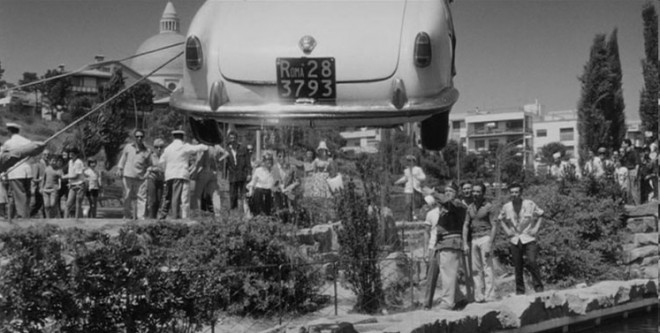Danny Boyle has made some of the most execrable films I have seen: Shallow Grave (1994), The Beach (2000) and 28 Days Later (2002). And now I have bought a cheap used copy of the DVD of one of his films, Trainspotting, about a pack of young, impoverished, heroin-addicted losers in contemporary Edinburgh. How did I come to do such a thing? Well, I was curious about the film and therefore asked a friend to tape it for me off a cable channel. He succeeded, however, in taping only the last twenty minutes. This whetted my curiosity, not abated it. Written by John Hodge from Irvine Welsh’s novel, Boyle’s Trainspotting hedges its bet, glorifying dangerous drug use—I understand that the novel, by contrast, is “non-judgmental”—while keeping handy an escape hatch through which it is ready and eager to plead, “Well, look how I show what a mess drugs make of these lives, how the use of heroin even kills.” But the film ends with a smirk, suggesting that a drug-free existence is tantamount to compromise. It may keep you alive, but alive for a life that isn’t appealing, that may even be not worth living. I don’t know for what I hate Trainspotting more: its nihilism or its smirk.
“Choose life. . . . Why would I do that? I choose not to choose life,” declares self-admitted “bad person” Mark “Rent-boy” Renton, the cheerful, red-headed voiceover/protagonist, at the film’s outset, who tries ending his addiction. The slow-release opium suppositories he has inserted, meant to “bring him down” gently, give him a bad case of diarrhea, impelling his mad dash to the “worst” public toilet in Scotland. (This is typical of the level of humor at which this film operates.) After Mark, grinning widely, fills the bowl, he vomits into it and goes head-first down into it, his dirty white sneakers the last part of him to disappear into the wilds of water beneath; after a swim, he comes back up and out of the toilet—a clever use of reverse-motion. Various interjections of Mark’s fantasies skirt a line between seductive visuals and safety-hatch “exposure” of human damage. When a film thus moves in contrary social directions simultaneously, there is no telling what aspects are unconscious on the part of the filmmaker. In any case, I have as little doubt that Boyle would deny that his film crusades for youthful drug dependency as I have that it in fact does. Boyle’s film speaks for itself.
Mark goes back to heroin. The film catalogues the illegal ways in which the boys procure drugs: “robbing, stealing, fucking people over.” Mark gets caught shoplifting but avoids incarceration by entering a drug rehabilitation program. Caught along with him, a mate is sent to prison. Somehow Mark must stick with the program, refraining from all drug use. It’s a losing battle. A strenuous passage records the cold-turkey withdrawal to which Mark’s parents subject him. Depression and boredom are up ahead—and (horrors!) workday respectability. But Mark’s “friends” succeed in pulling him back into the toilet, which has now deepened to include selling drugs. (He ends up betraying his partners-in-crime by stealing from them.) Along the way, Mark bonds with Diane (teenaged Kelly Macdonald, charming), an underaged school girl who makes him seem innocent by comparison. It is she who notes that times change and that old drugs are replaced by new favorites.
The other three fellows in the pack—Spud, Tommy and Sick-boy—are not allowed the screen time that Rent-boy is. Ewan McGregor, a crude, unappealing actor, plays Mark. The one good male performance comes from Robert Carlyle, who plays small-time criminal Francis Begbie, who is ten years older. Begbie decries the others’ chemical habits while downing booze. Carlyle alone is capable of rising above the simplistic material.
Trainspotting has become a cult hit, especially among young people. We can hope that these kids are not doing what we must fear they are doing while, zombie-like, they watch the movie over and over again.
